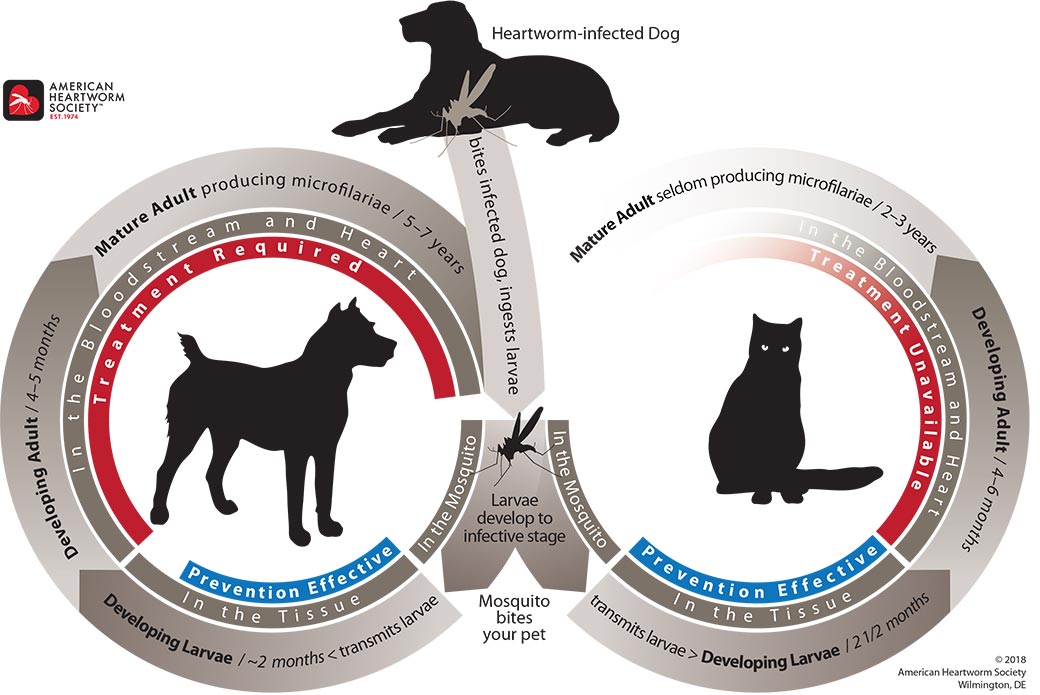April is the month dedicated to Heartworm Prevention! This is a time of year where we start seeing an increase in heartworm disease diagnoses. While heartworm disease is more easily transmitted in the warmer months, it is essential to understand that pets can contract it any time of year.
What is Heartworm Disease?
As its name suggests, heartworm disease is a disease caused by parasitic worms that invade the heart of an animal. Once your pet is infected, the worms begin to grow inside your pet’s body and can inhabit their heart, lungs, and blood vessels.

A heartworm infection starts in a pet with a mosquito bite. A mosquito bites an infected animal, picks up the parasitic worms (called Dirofilaria immitis) and later feeds on another dog, cat, or other pet. Once your pet is infected, worms begin to grow inside your pet’s body and can inhabit their heart, lungs, and blood vessels.
Veterinarians have diagnosed pets with Heartworm disease in all 50 states. Here in Texas, the number of heartworm cases per clinic is anywhere from 26 to 100+, which is relatively high and a primary reason we work hard regarding preventative treatment.
How Heartworm Spreads
Adult female heartworms living in an infected dog, fox, coyote, or wolf produce microscopic baby worms that circulate in their bloodstream.
When a mosquito bites and takes a blood meal from an infected animal, it picks up these baby worms, which develop and mature into “infective stage” larvae over 10-14 days. Then, when the infected mosquito bites another dog, cat, or susceptible wild animal, the infective larvae are deposited onto the surface of the animal’s skin and enter the new host through the mosquito’s bite wound.
Once inside a new host, it takes approximately 4-5 months for the larvae to mature into adult heartworms. Once mature, heartworms can live for 5-7 years in dogs and 2-3 years in cats. Because of increasing number of worms in an infected pet.
Symptoms of Heartworm
A pet can have heartworm without initially showing symptoms. Most infected patients are asymptomatic. The signs of heartworm disease depend on the number of adult worms present, the location of the worms, the length of time the worms have been in the pet, and the degree of damage that the heart, lungs, liver, and kidneys have suffered.
Most pets initially infected with heartworm do not show symptoms until the disease is more advanced. Following are symptoms to watch out for that could indicate your pet has heartworm:
- Occasional or persistent coughing: As the heartworm worsens, your pet’s cough will become more frequent.
- Trouble breathing: As the disease progresses, breathing may become more and more labored.
- Tiring quickly: With blood flow being blocked or partially blocked, your pet will become tired much more rapidly.
If you notice any of the above symptoms, whether it could be heartworm or not, bring your pet in for a checkup.
For more information on heartworm disease, please click on the picture below to watch a video produced by the American Heartworm Society.become tired much more rapidly.
Treatment of Heartworm Disease
Another reason preventing heartworms is so essential is that the treatment for a heartworm infestation is unpleasant for your pet. And it does come with significant risk. However, we can successfully treat most infected pets.
After assessing your pet’s condition, treatment takes several steps and may require your pet to stay in our care so that we can carefully monitor them. The complete process takes several months because we must destroy heartworms gradually. Killing them too quickly can be dangerous for your pet. Due to the length and complexity of treatment, treatment can become expensive. Preventing heartworm disease is much less costly than treating it.
How to Prevent Heartworm Disease
1. Routine veterinarian visits and heartworm testing: Schedule your pet for their annual checkup and heartworm testing with us to ensure your pet stays healthy.
2. Preventative medication: There are various preventative products that you can use on your dog to ward off mosquitoes and prevent heartworm. You can administer these products orally or topically. The combination of a heartworm preventive paired with an effective flea, tick, and mosquito repellent is most effective for preventing disease. Prevention is far more effective and less costly than treatment if your pet is diagnosed with heartworm. Heartworm medications are available only by prescription, and there are different options depending on your pet and your preferences. Talk to us about which heartworm medication is right for your pet.
3. Keep your home mosquito-free: Mosquitoes can also be a threat in and around your own home. Mosquitoes can breed in small amounts of stagnant water. Check out flowerpots, empty containers left outside (buckets, toys), rain gutters, and low-lying areas in the yard. Do your best to remove any stagnant water around your house to minimize their numbers.
4. Outdoor bug control: Minimizing bugs in your yard is very important in helping to keep bugs away from your pet. You may want to consider using insecticide spray for your yard. Be sure to choose a pet-friendly product and properly follow the manufacturer’s instructions.
Summary
Heartworm Disease is a potentially fatal disease, and it is hard to detect in its early stages. Treatment is difficult for pets and comes with significant risks. We cannot overstate the importance of heartworm prevention and heartworm testing. Prevention is easy, inexpensive, and pain-free. So, please keep your pets safe and healthy by contacting us and getting your pet on heartworm preventative medication if you have not already done so.
Sincerely,
Dr. Kim Stewart
College Hills Veterinary Hospital
